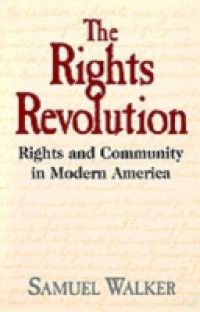The most dramatic change in American society in the last forty years has been the explosive growth of personal rights, a veritable "rights revolution" that is perceived by both conservatives and liberals as a threat to traditional values and our sense of community. Is it possible that our pursuit of personal rights is driving our country toward moral collapse? In The Rights Revolution, Samuel Walker answers this question with an emphatic no. The "rights revolution," says Walker, is the embodiment of the American ideals of morality and community. He argues that the critics of personal rights--from conservatives such as Robert Bork to liberals such as Michael Sandel--often forget the blatant injustices perpetrated against minorities such as women, homosexuals, African-Americans, and mentally handicapped citizens before the civil ights movement. They attack "identity politics" policies such as affirmative action, but fail to offer any reasonable solution to the dilemma of how to overcome exclusion in a society with such a powerful legacy of discrimination. Communitarians, who offer the most comprehensive alternative to a rights-oriented society, rarely define what they mean by community. What happens when conflicts arise between different notions of community? Walker concedes that the expansion of individual rights does present problems, but insists that the gains far outweigh the losses. And he reminds us that the absolute protection of our individual rights is our best defense against discrimination and injustice. The Rights Revolution is an impassioned call to honor the personal rights of all American citizens, and to embrace an enriched sense of democracy, tolerance, and community in our nation.

